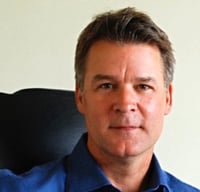
This blog comes from our eBook Surfer dudes, janitors and the Ritz-Carlton: Lessons in leadership and business culture.
Management consultant Kevin Catlin from Insight Strategies, Inc. generously shared three of his past blogs in the eBook, along with some updated comments at the end of each one.
We hope you enjoy the insights of this inspirational communicator and leadership expert.
'You can do better': the power of feedback
By Kevin Catlin
Insight Strategies, Inc.
I joined the army in July of 1976 but had to wait four months to turn 18 before I could be shipped off to basic. I was not a great soldier...
Sure I could manage my job as a Crew Chief for a UH-1H, ‘Huey’ helicopter. Sure, I was a pretty good door gunner and qualified every year by shooting an M60 machine gun while hanging from the bird in a chicken strap. It’s just that I wasn’t a very good overall soldier.
In many ways I resented the army. I often felt that by joining I had lessened my value in the world; that maybe I was above being an enlisted man in a peacetime army. In high school I saw myself going to college and then into business, but my average grades, poor attitude and the military being a family tradition all led to me joining. So I trudged through. Not a good soldier.
Three months before I was to be discharged I was ordered to meet with the company CO (Commanding Officer) Captain Roth.
When most of us think of soldiers, we think of big, strong, rowdy, bad-asses and many are, but just as many are cerebral, thoughtful and quietly powerful. That second type was Captain Roth; he was a quiet man, not that big physically, but still an airborne ranger, Vietnam vet, pilot, the whole package. While he was always a bit distant, he had a way about him that was compelling and admirable… the quiet leader.

At the time (and to this day) I struggled with absolute authority, which was a problem in the army, but I secretly admired Roth despite this.
When I was called into Roth’s office he had me stand ‘at rest’ for a while, while he shuffled papers. After a bit he looked up at me and asked quietly: “Catlin, what is your problem?”
I was confused. “My problem, sir?”
He raised his voice slightly. “You heard me son, I didn’t stutter… as far as I can tell you have not given the 10th CAV an honest day’s work since you have been here. So again, what is your problem?”
I thought for a moment, then answered, “I'm short, sir”, while holding my hand out with thumb and pointer finger an inch apart. Being ‘short’ meant that I was due to get out soon and consequently I was saying, in army slang: “F-U, I am outta here and there isn't much you can do about it at this point.”
He looked at me for a long moment before saying: "Son, I have been watching you. You have friends who care about you. You score off the charts in your aptitude tests. I read your jacket and the army offered you three different schools which would have made you an officer. Instead, you slide through, you do the least amount possible and have not grown as a soldier, at all, in two years.”
He paused, then finished with: “You can do better.” He then looked me straight in the eye for a few moments before saying, “now get out of here”.
As I turned away, my ears started to burn. Even as I write this, 36 years later, or if I’m telling this story in front of a class, during a coaching session, or sitting in my living room, my ears burn. Roth had called me out. He gave me feedback that stung, and I knew it to be true. And yet this feedback could be the greatest gift I have ever been given, in life and in business.
. . .
I didn’t change my ways immediately, that’s too simple for me. I need a lot more brick walls to bang my head against before stuff sinks in. But, because of Roth’s feedback I never delivered a half-day’s work to an employer again.
Roth knew I was ‘short’; he did not have to take his time to deal with a smartass 19-year-old kid heading down the wrong path. Why then?
Answer: He cared. He was a pro. He accepted that as a leader (manager) it was his duty to his soldiers (employees) to give them the hard truth. He loved his people enough to not allow them to simply fail because they didn’t know where they stood.
What if he hadn’t? I get spooked sometimes thinking about that. What happens to your team if you are unwilling to display the courage first, and compassion second, of a Captain Roth and all the best managers, and give that pivotal feedback?
I understand that in business today we can’t be as direct as Roth, but is that a reasonable excuse for letting people falter because we are unwilling to lead?
Who needs you to be a Captain Roth? Who needs you to hold the bar for them until they do it themselves?
Whether we accept it as a calling, or accept it as why we get paid, just accept it.
I owe you one Captain Roth. Thank you.
. . .
While this story was not my ‘biggest seller’, I often think it’s my most important.
Leadership is not passive. Great leaders/managers manage ‘things’ – they make sense out of chaos through controls and processes and, well, they manage that. Leaders also move people. They generate a universal understanding and provide direction.
How are we as leaders to provide this direction if we abdicate the responsibility to give candid, focused coaching and feedback? It’s not easy but it is what we are paid and, I hope, driven to do.
If you would like advice or support with staff management issues in your business, contact the team at JPAbusiness on +61 2 9893 1803 for a confidential initial discussion.
 James Price has over 30 years' experience in providing strategic, commercial and financial advice to Australian and international business clients. James' blogs provide business advice for aspiring and current small to mid-sized business owners, operators and managers.
James Price has over 30 years' experience in providing strategic, commercial and financial advice to Australian and international business clients. James' blogs provide business advice for aspiring and current small to mid-sized business owners, operators and managers.

